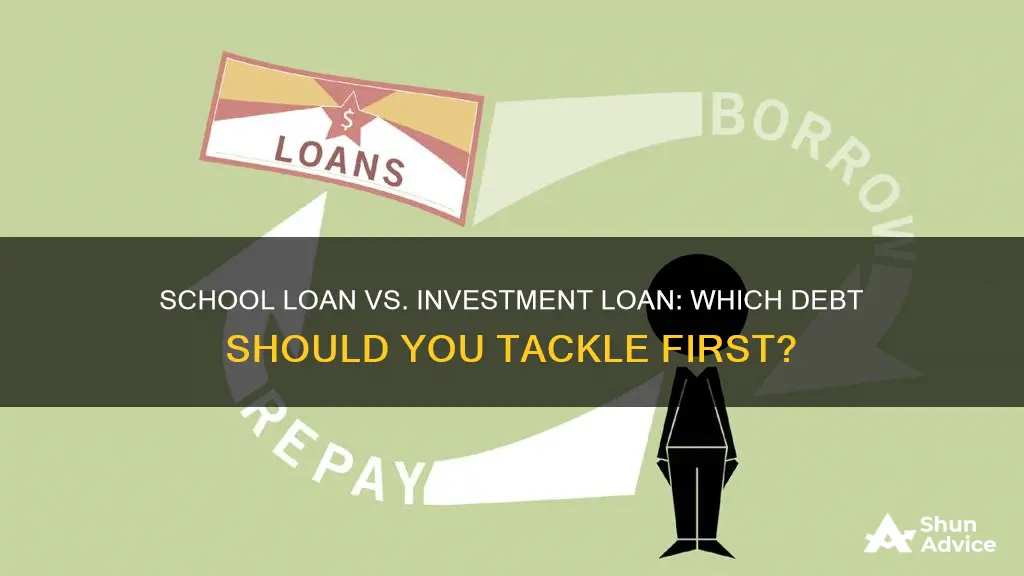
Deciding whether to pay off student loans or invest depends on your financial priorities and which option gives you a better return. If the rate of return on investing is higher than your student loan interest, then making minimum payments on your student loans and putting any extra cash toward investing may be a good choice. Conversely, if your student loan interest is higher than any possible return on investment, then focusing on getting out of debt faster may be the better path.
It’s important to note that, depending on your financial situation, you may not have to choose to invest over repaying student loans faster or vice versa. If you need help deciding what to do, contact an investment professional.
| Characteristics | Values |
|---|---|
| Interest rates | Student loan interest rates are generally lower than investment interest rates. |
| Tax deductions | Student loan interest payments may be tax-deductible, up to a certain amount. |
| Risk | Investments carry a degree of risk, whereas paying off student loans is a guaranteed return. |
| Cash flow | Paying off student loans can improve cash flow by reducing monthly payments. |
| Debt burden | Student loans can be a significant financial burden, impacting other financial goals. |
| Retirement savings | Investing for retirement can help build a secure future, but it may be challenging while paying off student loans. |
| Employer contributions | Employer-provided retirement plans with matching contributions can be a significant benefit. |
| Stress | Student loans can cause stress and impact lifestyle choices. |
What You'll Learn

Compare the interest rates of your student loan and investments
When deciding whether to pay off your student loan or invest, it's important to compare the interest rates of your student loan and potential investments. Here are some key points to consider:
Student Loan Interest Rates:
The interest rate on your student loan will depend on whether it is a federal or private loan. Federal student loans typically have higher interest rates than private loans, but they also come with benefits like Public Service Loan Forgiveness and income-driven repayment plans. For the 2024-25 school year, the federal student loan interest rate for undergraduates is 6.53%. Private student loan interest rates can vary from around 4% to 17%, depending on the lender and the borrower's credit score.
Investment Interest Rates:
When considering investments, it's important to remember that there is always a risk of losing money. Stocks typically offer a long-term rate of return of over 9% per year, but this can be volatile, especially for short-term investments. Other investment options include mutual funds, which can provide a safe and conservative return, or retirement accounts like a 401(k), which may include employer matching contributions.
Factors to Consider:
In addition to interest rates, there are several other factors to consider when deciding between paying off student loans and investing:
- Financial Goals: If your top priority is to become debt-free, you may want to focus on paying off your student loans first. On the other hand, if you're more concerned with building wealth and financial security, investing may be a better option.
- Interest Rate Comparison: Compare the interest rate on your student loan to the expected rate of return on your investments. If the investment rate of return is higher, investing may be more beneficial. Conversely, if your student loan interest rate is higher, paying off your loans first could save you more money.
- Loan Forgiveness: If you have federal student loans and are eligible for loan forgiveness programs, it may not make sense to make extra payments towards your loans. In this case, investing your money could be a better option.
- Cash Flow and Emergency Funds: Consider your monthly cash flow and whether you have enough savings to cover unexpected expenses. It's generally recommended to have at least three months' worth of expenses saved up before deciding between paying off loans and investing.
Shiba Inu: Who's Invested?
You may want to see also

Consider the tax deductions for student loan interest
When deciding whether to pay off student loans or invest, it's important to consider the potential tax benefits of both options. Student loan interest is tax-deductible if your modified adjusted gross income (MAGI) is below a certain threshold. For 2023, you can deduct up to $2,500 in student loan interest from your taxable income if your MAGI is less than $70,000 ($145,000 if filing jointly). If your MAGI is between $70,000 and $85,000 ($175,000 if filing jointly), you can deduct less than the maximum amount. This deduction is not an itemized deduction but is taken above the line, meaning it directly reduces your taxable income.
To claim the student loan interest deduction, you must meet several requirements. Firstly, you must have paid interest on a qualified student loan during the tax year. This includes both required and voluntarily prepaid interest payments. The loan must have been taken out solely to pay for qualified higher education expenses, such as tuition, room and board, books, and transportation for you, your spouse, or a dependent. Additionally, your filing status cannot be married filing separately, and you cannot be claimed as a dependent on someone else's tax return.
It's worth noting that student loan payments themselves are not tax-deductible. However, when you repay student loans, you are paying down both the original balance and the accrued interest. Therefore, you can deduct the interest portion of your student loan payments on your taxes.
In addition to the student loan interest deduction, there are other education tax credits and deductions available, such as the American Opportunity Credit, the Lifetime Learning Credit, and the tuition and fees deduction. These benefits can be claimed even if you paid for expenses with student loans.
When deciding between paying off student loans and investing, consider the potential tax benefits of each option. Consult a tax professional or financial advisor for personalized advice based on your specific circumstances.
Rwanda's Education: Invest in the Future
You may want to see also

Weigh the pros and cons of investing vs paying off debt
There are several factors to consider when deciding whether to invest or pay off debt. Both options are worthy goals, and it is possible to do both simultaneously. Here are some pros and cons of each to help you make an informed decision:
Pros of Investing:
- Investing can be a way to set money aside for the future and allow it to grow in value over time.
- If you can earn a higher interest rate on your investments than the interest you are paying on your debts, then investing may be a better option.
- Compounding interest: The earlier you start investing, the more time your money has to grow. For example, if you start investing at 25 years old and invest $6,000 per year with a 7% annual return, you could have $1.28 million by the time you turn 65.
- Tax benefits: Certain types of debt, such as student loan and mortgage interest, are tax-deductible. Investing in these types of debts can reduce your taxable income.
Cons of Investing:
- Volatility: Investments can fluctuate in value, and there is a risk of losing money.
- Lower return: If your investments have a lower rate of return than the interest on your debts, you may be better off paying off the debt first.
Pros of Paying Off Debt:
- Improve credit score: Paying off debt, especially credit card debt, can improve your credit score. This can make it easier to borrow money in the future, get approved for loans, and improve other aspects of your financial life.
- Peace of mind: Paying off debt can reduce financial stress and improve your mental and emotional well-being.
- Save money: The sooner you pay off debt, the less interest you will have to pay overall.
Cons of Paying Off Debt:
- Missed investment opportunities: If you focus solely on paying off debt, you may miss out on potential investment gains and the benefits of compounding interest.
- Longer debt burden: If you only make minimum payments on your debts, it could take a long time to pay them off, extending the burden of debt.
Ultimately, the decision to invest or pay off debt depends on your individual financial situation, risk tolerance, and goals. It is important to consider the interest rates on your debts, your ability to stay on top of payments, and your long-term financial objectives.
Home Improvement: Who's Spending the Most?
You may want to see also

Think about your financial goals
When deciding whether to pay off student loans or invest, it's important to consider your financial goals and priorities. Here are some factors to keep in mind:
- Emergency fund and retirement savings: Ensure you have at least three months' worth of expenses saved for emergencies. Additionally, aim to contribute around 10-15% of your income towards retirement savings.
- Interest rates: Compare the interest rate on your student loans to the expected rate of return on investments. If your student loan interest rate is higher, you may save more money by paying off the loans first. On the other hand, if your expected investment return is higher, investing may be a better option.
- Loan forgiveness and repayment assistance: If you are enrolled in a student loan forgiveness program or have access to repayment assistance, there may be no need to rush paying off your loans. In this case, investing could be a better option.
- Debt-free priority: If becoming debt-free is your top priority and will bring you peace of mind, focus on paying off your student loans first.
- Financial goals: Consider your other financial goals, such as saving for a house down payment or starting a business. If these goals are a higher priority, you may want to invest instead of paying off student loans.
- Age and time horizon: Your age and time horizon until retirement can impact your decision. If you're younger, you may have more time to save for retirement and can focus on investing. However, if you're closer to retirement age, paying off student loans first may be a better choice.
- Employer contributions: If your employer offers matching contributions to a retirement plan, such as a 401(k), consider taking advantage of this benefit by prioritizing investing over early loan repayment.
- Stress and lifestyle goals: If your student loans are causing you significant stress or hindering your lifestyle goals, such as owning a home, you may want to prioritize paying them off first.
- Variable-rate loans: If you have private student loans with variable interest rates, paying them off quickly can protect you from potential market fluctuations and save you money in the long run.
- High-interest debt: If you have other high-interest debt, such as credit card balances or personal loans, focus on paying off those first before investing or contributing extra payments towards student loans.
Investing in People: The Church's Role
You may want to see also

Assess your risk tolerance
When deciding whether to pay off student loans or invest, it's important to assess your risk tolerance. This involves understanding how much risk you are willing to accept and how much your finances can handle. Here are some factors to consider when assessing your risk tolerance:
- Age: Younger investors are generally considered to have a higher risk tolerance than older investors due to their longer time horizon. However, age should not be the sole factor, as people are living longer and can remain aggressive investors well into their retirement years.
- Financial situation: Consider your income, expenses, and debt obligations. If you have high-interest debt, such as credit card debt or personal loans, it may be more prudent to focus on paying off those debts first. Additionally, if you have unstable income or are living paycheck to paycheck, you may have a lower risk tolerance.
- Investment goals: Understand what you are saving and investing for. If you are investing for retirement, you may have a longer time horizon and be able to tolerate more risk. On the other hand, if you are saving for a short-term goal, such as a down payment on a house, you may have a lower risk tolerance.
- Investment experience: Your level of experience in investing can also impact your risk tolerance. If you are new to investing, you may want to proceed with caution and focus on more conservative investments.
- Net worth and risk capital: Your net worth and the amount of risk capital you have available can affect your risk tolerance. Individuals with a higher net worth and more risk capital may be able to tolerate more risk, as they have more financial resources to fall back on if investments don't perform as expected.
It's important to carefully consider these factors and seek professional advice if needed to determine your risk tolerance. This will help you make informed decisions about paying off student loans or investing.
Tesla Stock: Buy or Bye?
You may want to see also
Frequently asked questions
The answer depends on your financial situation and risk tolerance. If you prefer more specific investment advice, consider contacting a Certified Financial Planner (CFP).
While the answer depends on your unique situation, it’s generally a good idea to avoid high-risk assets, like cryptocurrency.
Whether you should make contributions to your retirement account while repaying student loans depends on your financial circumstances. If you can afford to invest and pay down student debt at the same time, doing so may be a smart idea. However, if contributing to your retirement account puts you at risk of defaulting on your loan, consider prioritizing repaying your loans.
Deciding to pay off your student loans or invest depends on what your financial priorities are. Paying off your loans early will likely save you on interest expenses, though eliminating your loans doesn’t mean you’ll increase your future savings. Investing can potentially position you for a more secure future, but it may be risky and you’ll still have loan debt.
When it comes to personal finance, experts usually recommend focusing on two things: paying off debt and saving for retirement. But it can be tricky to save for retirement if you’re saddled with student loan debt. To help you decide where to put your funds, consider factors like your interest rate and financial goals. If you desire to become debt-free quickly, putting your extra money toward removing student debt is ideal. However, investing could be a better option if your expected rate of return is higher than your student loan’s interest rate or if you want to work on your financial security.







